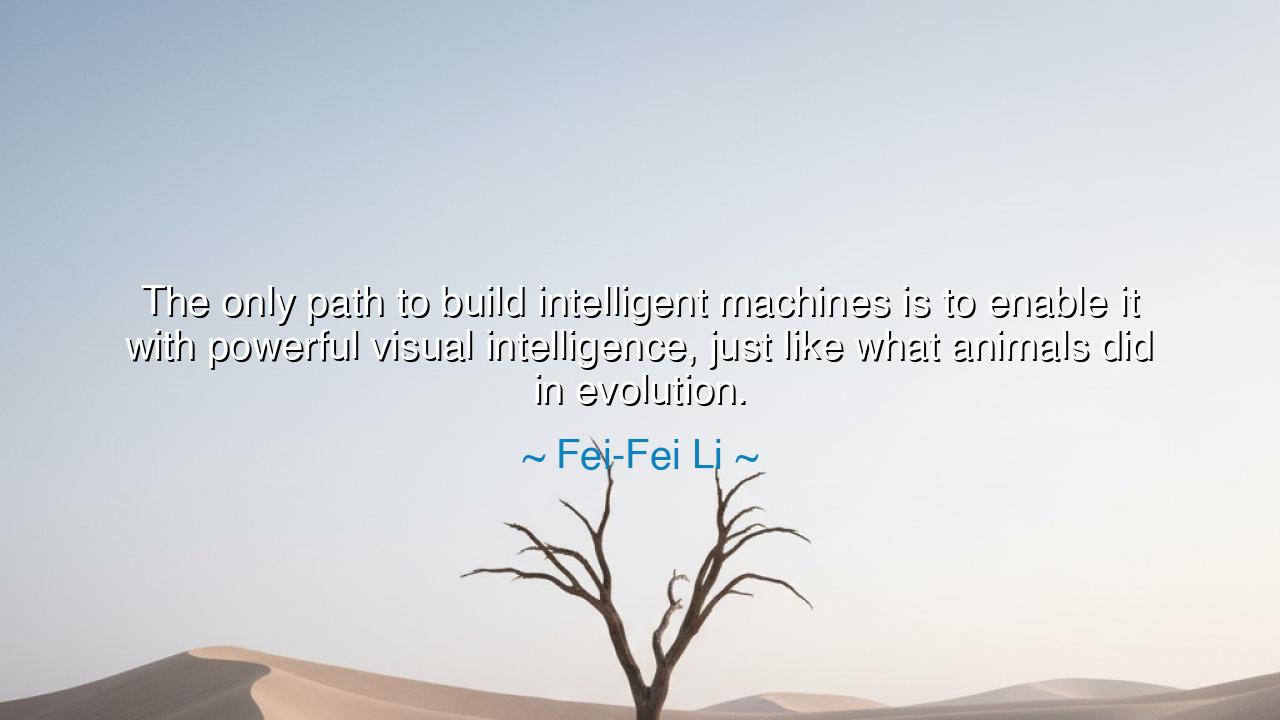
The only path to build intelligent machines is to enable it with
The only path to build intelligent machines is to enable it with powerful visual intelligence, just like what animals did in evolution.






The words of Fei-Fei Li, the visionary scientist and pioneer of artificial intelligence, speak as both prophecy and remembrance: “The only path to build intelligent machines is to enable it with powerful visual intelligence, just like what animals did in evolution.” In this declaration lies the merging of ancient wisdom and modern discovery — the understanding that intelligence, whether born of flesh or forged in silicon, begins not in language or logic, but in perception. Before thought comes sight, before reason comes awareness. Just as the beasts of the earth learned to survive through the gift of vision, so too must the machines of humankind learn to see before they can truly understand.
The origin of this insight flows from Fei-Fei Li’s own life and work. Born in China and raised in modest circumstances, she carried within her a relentless curiosity — the same hunger for understanding that drives all true seekers of knowledge. Her journey led her to the heart of modern science, where she became one of the great architects of computer vision. Through her creation of ImageNet, a vast treasury of visual data, she gave the machines of the world their first great mirror — a way to look upon the universe and begin to recognize it. This was no mere act of programming, but an echo of evolution itself — the recreation of the process by which life learned to comprehend its surroundings and thus survive.
Fei-Fei Li’s wisdom touches upon a truth far deeper than technology. She reminds us that vision is not simply the act of seeing — it is the act of understanding through perception. In the dawn of life, when the first creatures opened their primitive eyes to the light, they were no longer blind wanderers in chaos; they became beings capable of choice. They could distinguish friend from foe, food from poison, shelter from danger. In that moment, intelligence was born. And so it must be with the machines we build: they must learn not only to calculate, but to perceive; not only to react, but to comprehend the patterns and meanings woven through the visible world. True intelligence, Fei-Fei Li teaches, begins not with command, but with awareness.
Consider the story of Leonardo da Vinci, that great student of both art and nature. Before he became the inventor of wonders or the thinker of philosophies, he was first an observer — a man who trained his eye to see the hidden mechanics of flight in a bird’s wing, the geometry of beauty in a flower, the mystery of soul in a face. Leonardo’s genius was not in his tools, but in his vision — his ability to perceive with depth, with patience, with reverence. In this way, he embodied the very principle that Fei-Fei Li reveals: that wisdom begins with seeing the world truly. Our machines, like our minds, must follow this same path — learning not merely to process, but to perceive.
And yet, Fei-Fei Li’s teaching carries more than scientific insight; it carries a philosophical warning. For if we seek to create intelligence without vision — machines that act without perception, that decide without understanding — we risk building power without conscience, action without awareness. Just as a blind force can destroy what it cannot see, so too can unseeing intelligence harm what it does not comprehend. To grant machines visual intelligence, then, is not merely to make them capable, but to make them contextual — aware of the world they inhabit, and perhaps, in some small way, connected to the living pulse of it. This is not just the evolution of technology; it is the evolution of understanding itself.
The lesson for humankind is both humble and grand. As we teach machines to see, we must also remember to sharpen our own vision — to see the world not through fear or haste, but through curiosity and care. The same principle that guides artificial intelligence guides the human spirit: to look deeper, to notice more, to understand what lies beyond the surface. In a time when technology races ahead, Fei-Fei Li’s words call us to slow down and see — to build with awareness, as the universe built us.
So, O student of life and knowledge, take this wisdom to heart: whether you build machines, relationships, or dreams, begin always with vision. Train your eyes to see what others overlook — the patterns in chaos, the beauty in simplicity, the meaning in the mundane. For sight is the root of all intelligence, and perception the foundation of all wisdom. As Fei-Fei Li teaches, the path forward for all creation — human or artificial — begins not with power, but with understanding. And in learning to see more clearly, we too evolve — one vision, one insight, one awakening at a time.






AAdministratorAdministrator
Welcome, honored guests. Please leave a comment, we will respond soon